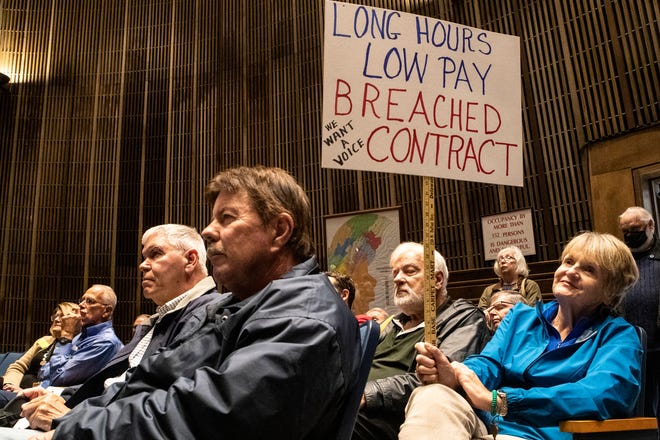The Delaware General Assembly will hold a special session later this month to vote on adding more oversight to the transition of state retirees’ health care plan to Medicare Advantage, a move that has been protested across Delaware in recent weeks.
Yet retirees are still looking to reject this plan altogether, as a lawsuit seeks to block the transition to Medicare Advantage, a type of Medicare plan offered through a private insurer.
The special session, which has bipartisan support in both chambers, will be on Oct. 26, just two days after the deadline for retirees to opt out of the Medicare Advantage plan. If retirees do, they would lose their state-funded health care, which state officials are strongly urging retirees against.
Retirees are hoping the court will make a ruling before the deadline later this month. The plan goes into effect Jan. 1, 2023.
BACKGROUNDDelaware plans to change its retiree health care plan. Seniors are mad and fighting back
The Legislature will not vote to block this contract with Highmark Blue Cross Blue Shield Delaware. Lawmakers have said they do not have the power to do that.
Instead, they will vote to create a subcommittee under the State Employee Benefits Committee that will “add further oversight to the transition process.” It will be made up of state retirees, sitting legislators and union representatives who will “monitor Highmark’s performance during the three-year life of the current contract,” according to a news release.
Senate Bill 348, which has yet to be filed, would also create an ombudsperson in the Department of Human Resources, tasked with assisting state pensioners with the transition under the new plan.
RISEDelaware, a nonprofit that formed to advocate for retirees and fight this change, called the special session a “pathetic distraction to placate retirees and pretend that the new Medicare Advantage plan resembles our current plan in any way.”
“An actual reading of the plan documents would show legislators the all too real dire problems retirees will face,” the group said in a statement.
Delaware officials, earlier this year, decided to move to a Medicare Advantage plan as a way to decrease the state’s ballooning unfunded liability. Estimates show it could grow to $33 billion by 2050.
These types of private plans have received intense public scrutiny. The U.S. Department of Health and Human Services Office of the Inspector General published a report this spring that found that there have been “widespread and persistent problems related to inappropriate denials of services and payment.”
A New York Times investigation published this week found that health insurers exploited this program in order to increase their profits by billions of dollars. They do this, the New York Times reported, by creating systems to make their patients appear sicker – yet not providing additional treatment.
In Delaware, many retirees worry they are being forced to sign up for health insurance that could deny or delay care. Many say they worked for the state for decades in order to obtain the state’s robust retirement package. Now, they feel betrayed.
The decision to move to Medicare Advantage caught retirees and several lawmakers off guard this summer. Lawmakers previously voted on this decision to move to Medicare Advantage in June as part of the state’s budget. But Rep. John Kowalko, one of the most vocal critics against this plan, said lawmakers were misled.
Kowalko is retiring in January and will be dependent on the state’s retirement benefits. He said in an interview Monday that he will not support his legislation.
“It’s a deliberate cop-out,” he said.

The bill, Kowalko said, is a way to excuse the General Assembly’s “negligent behavior by passing something which doesn’t mirror any kind of legitimate reform to what the retirees are facing.”
He believes the General Assembly could have done something to block Medicare Advantage weeks ago before a contract was signed. Lawmakers, he said, have now decided to take some type of action when their hands are tied.
The Senate Democratic caucus did ask the Carney administration to delay the implementation of the contract – which officials declined citing contractual obligations already in place. And as a response to the outrage, the state and Highmark also agreed to a four-month delay of preauthorization requirements, among other concessions.
Kowalko recently helped found RISEDelaware, which stands for Retirees Investing in Social Equity Delaware. The organization is a part of the lawsuit.
Filed in Delaware Superior Court, the suit argues that the state failed to follow administrative procedures when implementing this change, specifically by failing to have retirees offer input.
HISTORIC RULING:Delaware Supreme Court finds vote by mail, same-day registration unconstitutional
New York retirees filed a lawsuit to fight a similar change to a Medicare Advantage plan. In March a judge ruled that the city must allow retirees to opt out of the Medicare Advantage plan and maintain their current health care plan.
At a rally last week, a couple dozen retirees gathered inside New Castle County Council chambers, wet from the rain, to protest these changes. Several expressed frustration with the lack of response, and action, from their respective representatives and senators. There will be another rally at Legislative Hall on Oct. 12.
“I spoke for the state,” said Marsha White, a retired state prosecutor, “who is speaking for us?”
“The idea that this was done behind our backs,” she said during the rally, “without us at the bargaining table and only finding out about it haphazardly – so many people still not knowing about it – is a travesty.”
The retirees also came with their own signs. One read: “We are not dead yet! And we vote.”